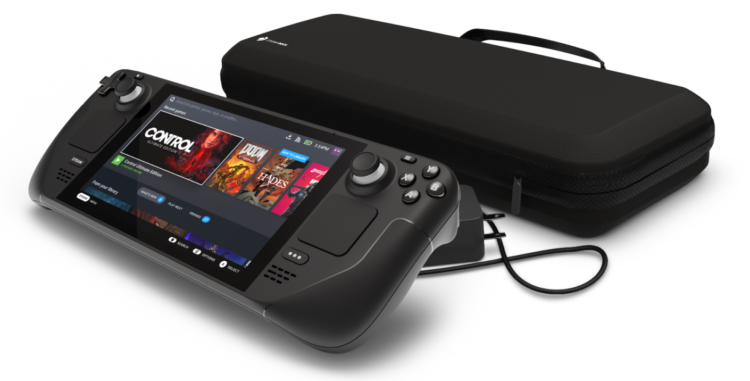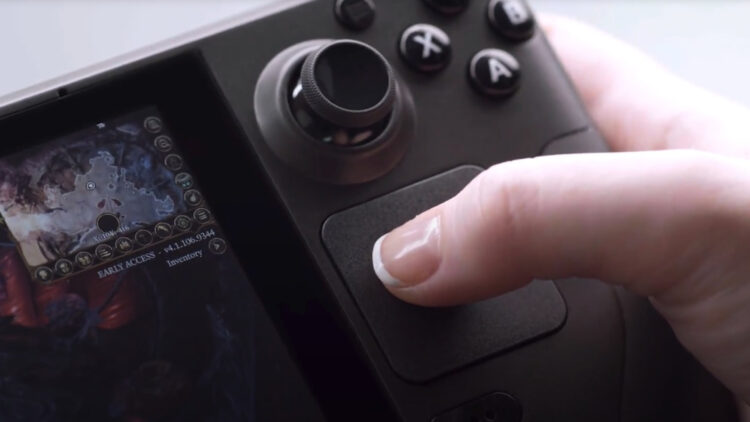
Steam Deck
We all know Steam Deck today. The Valve handled PC is in fact very similar, at least in design and intentions (including the dock, the price of which we still do not know today) to Nintendo Switch. Yet, over the years, Gabe Newelle and associates have tried different designs, including a decidedly curious "matryoshka" one, which involved two other hardware produced by the company, namely Steam Link and Steam Controller, which were not successes at the level of sales, so much so that they have been abandoned completely.Scott Dalto, one of the Valve designers, who with IGN has retraced the history of Steam Deck and how it is to reveal everything born this new hardware. According to the words of Dalton, in the first days when the idea flashed in the head of the development team, the very first prototype of the handled PC was a sort of matryoshka: the whole base would have been on an elongated Steam Controller, with a screen. in the center, which included Steam Link for content playback. Strange, right?
"At first we thought we could take Link's hardware, plug it into the Controller and put the screen inside," Dalton's words. Fortunately (or unfortunately?) This design never saw the light. And so the Steam Deck was born (after other failed attempts) as we know it, that is, as a completely independent hardware and unrelated to two other products. And it was not possible to see it because there were simply many technical limitations that did not allow its realization. Averted danger, therefore.
Finally, if you think that Steam Deck is a completely new project, Dalton denies you. In fact, according to his words, Valve has been thinking about it since the beginning of the new 10's. This means that from 2010 onwards the company has continued to work on concepts and products and has seized the opportunity when technology has allowed the realization of a similar idea.
You can also play on the go with the Surface Pro thanks to the Xbox cloud: if you are interested, find the new Microsoft hardware on Amazon.
Steam Deck: Why it could succeed. Why it can fail. And what may actually happen
Two weeks ago, Valve stunned the gaming world when it it announced its new handheld device, the Steam Deck. There had been rumors that it was working on a handheld system, but it just didn’t seem that likely. However, at this point, should we really be surprised about anything that Valve does? Even the release of Half-Life 3 would now be seen as so unlikely, it could be the very thing that Gabe sets his team to do. Let’s take a look at the Steam Deck, and why it could succeed, why it may fail, and what can really happen.
First off, let’s talk about what makes the Steam Deck look so promising.
Why Steam Deck can succeedThe obvious comparison for Steam Deck is the Nintendo Switch. Say whatever you want about the lack of power in Nintendo’s hybrid machine, but there’s no denying its success. The Switch has sold well over 80 million units and is continuing to top system sales charts. And with a handheld-only version of the system available, yet no version that requires a TV connection, there’s no doubt that there is a big market for portable gaming systems. Valve clearly desires to tap into this market.
While more expensive than the Switch (considerably so in the higher storage options), the Steam Deck is still priced quite aggressively. In terms of graphical power, it’s probably best compared with the Xbox Series S; the cheapest version of the Steam Deck is only $100 USD more expensive than the console. With Microsoft prepared to take a hit on every Xbox sold (as the company is more interested in drawing people into the Xbox ecosystem), this could mean that Valve, too, could be earning little on each Steam Deck sold.
So, with a competitive price and following a popular gaming trend, the Steam Deck already stands in good stead. This isn’t all that the system has going for it, though. First of all, this is a Valve product, so the actual hardware will be well designed and crafted. Whether it’s a result of working on products for so long before release, or because it launches fewer but better products, anything with the stamp of Valve tends to be a great piece of kit. Secondly, this is a great entry point for console gamers to enter the PC ecosystem. The updated version of SteamOS will look quite familiar to PlayStation, Switch, and Xbox owners, making it feel more accessible.
The Steam Deck really does have a lot of potential to succeed. It will no doubt be a great piece of hardware. It’s priced pretty aggressively. There’s obviously a public interest in gaming on the go with the success of the Switch, as well as how big gaming is in the mobile market. Steam Deck could easily become a massive success and introduce lots of console gamers to the PC ecosystem.

There’s no denying that the team at Valve is brilliant at what it creates. Back when it used to make games more often, seeing the name Valve on a game box guaranteed a particular level of quality. As the company has moved away from making games and creating hardware and ancillary systems, the level of quality has remained. However, the level of success has not. The one exception to this is of course the Steam store, but it is this that funds everything else. The Steam Machine concept was a great idea, but it never really took off in the way that Valve had hoped. Part of that concept was the Steam Controller, which, despite being a great bit of kit, never really achieved the success it deserved.
More recently, we have seen the Valve Index VR headset. Again, this is an amazing piece of kit that never really hit the heights that it should have. At around $1,000 USD a unit, the Index has managed to only corner a small portion of the market in late 2019. I can’t help but think that the Steam Deck could well end up being just like these previous projects.
Despite the Steam Deck being priced quite aggressively, it’s still not a cheap piece of hardware. The entry model may only be $399USD, however the preferable 512 GB model is an eye-watering $649 USD. As something that is primarily aimed at drawing console gamers into the PC space, that is a challenging price point. At $150 USD more than the PlayStation 5 and Xbox Series X, it’s unlikely that many console owners will be convinced. It’s not even as though console owners will have a large Steam library of games waiting for them to play on the machine. This makes it a better deal for people who primary play on the PC. Yet, with everyone still trying to pick new graphics cards after the shortages, it’s not the ideal time to market a new system to them.
And speaking of shortages, you can pretty much guarantee that all but a handful of lucky customers won’t be able to pick up a Steam Deck anywhere near launch. There is a real worldwide shortage of microchips at the moment. Anyone who’s been looking to pick up any of the new GeForce graphics cards or even a PlayStation 5 or Xbox Series X will tell you how significant the shortages are. Valve couldn’t keep up with demand for its Index VR Headset, and there were no global shortages of components at that time. We would be astounded if the supply of the Steam Deck gets anywhere near the demand.
Unfortunately, as great as Valve is in creating things, the company rarely manages to translate that into great success when it comes to hardware. I can’t help but think that the Steam Deck will become something of a curiosity like the Steam Controller or Steam Machine.

While we would love to see the Steam Deck succeed and become a huge success, it’s difficult to see it achieving that. However, there is a chance it could be a success as pre-orders seem to be flying in. It will be interesting to see how many of those pre-orders result in sales. With a pre-order buy-in of only $5 USD, it will have encouraged a lot of people to add their names to the list. It may be a little different when it comes to paying the remaining hundreds of dollars to fulfill the purchase, though. However, the biggest issue is probably going to be supply. There are still worldwide chip shortages, and Valve isn’t known for providing a lot of stock anyway.
We can’t help but wonder whether the Steam Deck is more a case of Valve suggesting to other manufacturers what they should do to develop the PC market. Unlike the Nintendo Switch, it would be very easy for another manufacturer to copy the idea of Steam Deck and come up with their own handheld PC. While the technology and design of the Steam Deck are great, any copyright claims can easily be dodged with a slightly different layout. If companies like Dell, HP, and an array of other manufacturers see the Steam Deck become a hit, you can bet that they will be creating their own handheld PCs very quickly. This would mean that even if the Steam Deck is a hit, it probably won’t end up being a runaway success for Valve as they will end up sharing any success with others.
As an interesting concept and even a curiosity, there are quite a few of us here at PC Invasion who are interesting in picking one up. Obviously, we hope that it will succeed, as bringing more gamers into the PC ecosystem is always a good thing. Only time will tell where the system will land. It could end up filling in as the mythical Switch Pro that so many gamers were hoping for or a misfire like the Ouya console (for those that remember that). Guess, we’ll just have to wait and see.